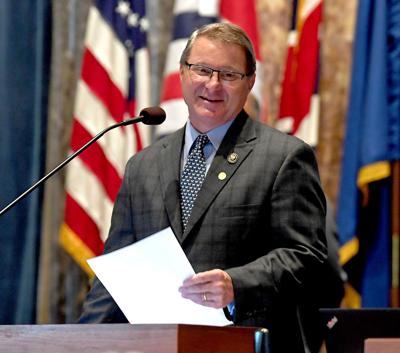- BY MARK BALLARD | CAPITOL BUREAU EDITOR JUN 27, 2020 – 6:00 PM

As the Louisiana Legislature heads into its final 48 hours of what has been two back-to-back sessions, overwhelming Republican majorities were able to strip the name of George Floyd, whose death while being detained by Minneapolis police set off a wave protests across the globe, from a resolution seeking to study Louisiana police procedures.
The majority also advanced legislation providing tax breaks for businesses, balanced the number of state construction projects with the money available, and diverted a portion of federal dollars destined for local governments to small businesses harmed by the coronavirus shelter-in-place orders.
Still on their agenda is what Republicans call “tort reform,” aimed at lowering auto insurance rates, which has been stalled by opposition to the dramatic reworking of how state courts operate that supporters say are needed to accomplish the goal. But some form of tort reform likely will be delivered to the governor before lawmakers adjourn at 6 p.m. Tuesday.
And operating budgets for state government, the legislature and the judiciary — their main reason for meeting — no doubt will win final passage just in time to avoid sending prison guards home, pulling state troopers from the highways and shutting down government, as would be legally required if no budget is passed by July 1.
GOP legislative leaders say they want next fiscal officer to act in independent manner
The development that will have the most sweeping impact on the future of Louisiana, however, was one imposed by the GOP legislative leadership with little fanfare and less notice: Changing fiscal notes — detailed descriptions of how much a proposed measure will cost taxpayers — to favor tax cuts.
Implementing what’s called “dynamic scoring” was one of the reasons Senate President Page Cortez gave for ousting Legislative Fiscal Officer John Carpenter. His replacement, Christopher Keaton, told the legislators in his job interview last week that he’d do all that’s possible and reasonable to include dynamic scoring in fiscal notes that are all important in the success or failure of a particular legislative proposal.
At least one reason why the tax breaks will only take about $80 million out of this year’s revenue stream — instead of the high nine figures initially sought — is because the lawmakers in charge of drafting the budget started doing the math contained in the fiscal notes.
For instance, House Bill 506, which would have dramatically reduced the severance tax oil companies pay the state, passed the House overwhelmingly but was parked in the Senate. State Rep. Phillip DeVillier, R-Eunice, argued that cutting taxes would prompt oil companies to drill more and thereby employ more people who would buy more goods and pay more taxes. He said increased economic activity would more than cover the $151.4 million the fiscal note stated would be lost to state and parish governments for providing services.
DeVillier provided no evidence, but he could be right.
Lowering taxes, in some cases, does promote greater investment, says the Heritage Foundation, the Washington, D.C.-based conservative think tank that has been pushing for years the use of “Dynamic Scoring” in drafting fiscal notes.

Independent fiscal officer ousted by Louisiana GOP after cost estimate angered lawmakers
Fiscal notes in Louisiana and most other states use static scoring, which is basically how much money the proposal costs and will take out of the state budget. It’s, basically, the raw cost of building a bridge. Dynamic scoring estimates the revenue from increased economic activity — new jobs and goods sold — created by the project, making the legislation more attractive.
Wealthy private companies have been using dynamic scoring for years, but they have the time and money to, unlike DeVillier, find the models and data that supports increased economic activity.
About 15 states have adopted dynamic scoring over the past decade, with most abandoning the idea. The rich megastates like California, New York and Texas have continued to use some form of the idea but not as extensively as the U.S. Congress has.
One problem is the difficulty states have in pulling off an analysis because of limited staff working under immense time pressures to draft fiscal notes for a thousand or so bills about to be considered in state assemblies.
Kansas is Louisiana’s go-to example of “we’re better than” when it comes to budgeting, kind of like Mississippi is Louisiana’s point of favorable comparison for education and poverty.
The Sunflower State used dynamic scoring in 2012 to adopt major reductions for income taxes. The changes on paper amounted to an $824 million loss or about 13% of its state budget, some of which was to be offset by increased economic activity. Those revenues from more spending and more employment didn’t happen, leaving Kansas legislators struggling to bridge a huge budget gap with drastic cuts in services.
The state, which has been dominated by Republicans since 1860, elected a Democratic governor in 2018.
